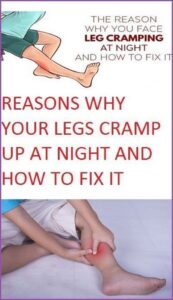“Reasons Why Your Legs Cramp Up at Night and How to Fix It”:
Reasons Why Your Legs Cramp Up at Night and How to Fix It
Leg cramps, those sudden, involuntary muscle contractions that can be excruciatingly painful, are a common nighttime occurrence. While they can strike at any time, they seem to be particularly prevalent during sleep. If you’re tired of waking up with a Charley horse, read on to learn about the potential causes and how to find relief.
Common Causes of Nighttime Leg Cramps
-
Dehydration: When you’re dehydrated, your body loses fluids, including electrolytes like potassium, magnesium, and calcium. These minerals play a crucial role in muscle function, and a deficiency can lead to muscle cramps.
-
Overuse: Overexerting your muscles during the day, whether through exercise or strenuous activity, can make them more prone to cramping at night.
-
Mineral Deficiencies: As mentioned, deficiencies in potassium, magnesium, and calcium can increase your risk of leg cramps.
-
Pregnancy: Hormonal changes and increased weight during pregnancy can put additional strain on muscles, making them more susceptible to cramping.
-
Medications: Certain medications, such as diuretics (water pills) and some blood pressure medications, can increase the risk of leg cramps by depleting electrolytes.
-
Medical Conditions: Certain medical conditions, such as diabetes, kidney disease, and peripheral artery disease, can also increase the risk of leg cramps.
How to Prevent and Treat Nighttime Leg Cramps
-
Stay Hydrated: Drink plenty of fluids throughout the day, especially water and electrolyte-rich beverages like sports drinks or coconut water.
-
Stretch and Exercise: Regular stretching, especially before bed, can help improve muscle flexibility and reduce the risk of cramping. Gentle exercise, such as walking or swimming, can also help strengthen muscles and improve circulation.
-
Adjust Your Diet: Include plenty of potassium-rich foods in your diet, such as bananas, spinach, and sweet potatoes. Magnesium-rich foods like dark leafy greens, nuts, and seeds are also beneficial.
-
Massage: Gently massaging the cramped muscle can help relieve pain and promote relaxation.
-
Warm Compress: Applying a warm compress to the affected muscle can help relax the muscle and reduce pain.
-
Address Underlying Conditions: If you suspect that a medical condition is contributing to your leg cramps, consult with your doctor for proper diagnosis and treatment.
If you experience frequent or severe leg cramps, it’s important to consult with your doctor to rule out any underlying medical conditions and to discuss appropriate treatment options.
